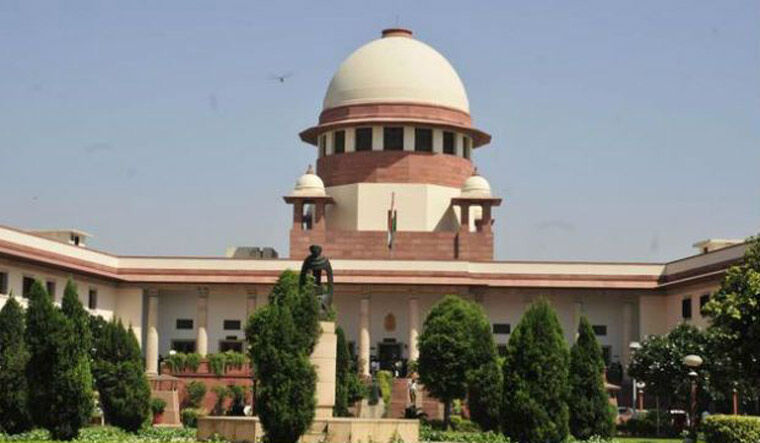Inaction of some officials can't be basis to infer pre-planned conspiracy by authorities: SC

New Delhi: The inaction or failure of some officials of one section of the administration cannot be the basis to infer a pre-planned criminal conspiracy by the authorities or to term it as a state-sponsored crime against the minority community, the Supreme Court said on Friday while upholding the SIT's clean chit to then Gujarat chief minister Narendra Modi and 63 others in the 2002 riots.
The apex court said there must be credible evidence regarding the state-sponsored breakdown of law and order situation and conspiracy cannot be readily inferred merely based on inaction or failure of the state administration.
The remarks were made by a bench headed by Justice A M Khanwilkar that dismissed a plea by slain Congress leader Ehsan Jafri's wife Zakia Jafri, who had alleged a larger conspiracy during the 2002 violence and had challenged the Gujarat High Court's October 5, 2017 order rejecting her petition against the SIT decision.
In any case, inaction or failure of some officials of one section of the state administration cannot be the basis to infer a pre-planned criminal conspiracy by the authorities of the state government or to term it as a state-sponsored crime (violence) against the minority community, the bench, also comprising Justices Dinesh Maheshwari and C T Ravikumar, said.
It said the SIT had noted that inaction and negligence of the erring officials have been taken note of at the appropriate level, including by initiating departmental action against them.
Such inaction or negligence cannot pass the muster of hatching of a criminal conspiracy, for which the degree of participation in the planning of commission of an offence of this magnitude must come to the fore in some way, the bench said, adding, the SIT was not there to enquire into the failures of state administration but the remit given to it was to enquire into the allegations of larger criminal conspiracy.
It noted that the SIT had not found any conspiracy for linking the separate incidents of mass violence across the state during the investigation of nine separate crimes, including the Godhra train incident, dealt with by the SIT under the strict vigil and supervision of the apex court and ably assisted by the amicus curiae playing the role of devil's advocate .
The bench noted that in the enquiry undertaken by the SIT, it was found that developments were in quick succession and had overrun the arrangements already in place or for that matter, additional support by calling the Army on February 28, 2002, itself besides the curfew imposed in the most disturbed areas of the state.
In light of such timely corrective measures taken by the state government in right earnest and repeated public assurances given by the then Chief Minister that guilty will be punished for their crime(s), and to maintain peace, it would be beyond the comprehension of any person of ordinary prudence to bear suspicion about the meeting of minds of named offenders and hatching of the conspiracy by the state at the highest level, as alleged, much less grave or strong suspicion as being the quintessence for sending the accused of trial for an offence of criminal conspiracy, it said.
The bench observed that the overrunning of state administration is not an unknown phenomenon and it has been witnessed all over the globe during the second wave of the COVID-19 pandemic, where the countries with even the best medical facilities crumbled and their management skills were overrun under the pressure.
It said the protagonists of the quest for justice sitting in a comfortable environment in their air-conditioned office may succeed in connecting failures of the state administration at different levels during such horrendous situation, little knowing or even referring to the ground realities and the continual effort put in by the duty holders in controlling the spontaneous evolving situation unfolding aftermath mass violence across the state.
The apex court said linking of such failures is not enough to entertain a suspicion about hatching of criminal conspiracy at the highest level, which requires a concerted effort of all the persons concerned and more importantly, clear evidence about the meeting of minds to accomplish such design.
It said breakdown of law and order situation if for a short duration, cannot partake the colour of the breakdown of rule of law or constitutional crisis.
The bench observed that misgovernance or failure to maintain law and order during a brief period may not be a case of failure of constitutional machinery in the context of tenets embodied in Article 356 of the Constitution.
Article 356 deals with provisions in case of failure of constitutional machinery in the state.
There must be credible evidence regarding the state-sponsored breakdown of law and order situation; not spontaneous or isolated instances or events of failure of state administration to control the situation, it said.
Suffice it to observe that the breakdown of law and order situation in the state including attributable to the alleged inaction of the (state) duty holders, owing to spontaneous mass violence cannot be a safe measure to infer as being a part of the criminal conspiracy at the highest level of political dispensation unless there is clear evidence to so conclude regarding the meeting of the minds of all concerned and their concerted efforts to commit or promote the commission of such crime, it noted.



